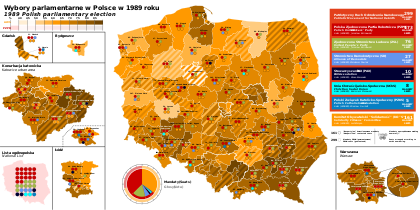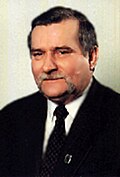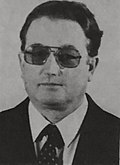
Back Eleccions parlamentàries poloneses de 1989 Catalan Parlamentswahlen in Polen 1989 German Pola parlamenta balotado en 1989 Esperanto Elecciones legislativas de Polonia de 1989 Spanish انتخابات قانونگذاری ۱۹۸۹ لهستان Persian Puolan parlamenttivaalit 1989 Finnish Élections parlementaires polonaises de 1989 French Olltoghchán na Polainne 1989 Irish Elezioni parlamentari in Polonia del 1989 Italian 1989年ポーランド議会選挙 Japanese
You can help expand this article with text translated from the corresponding article in Polish. (May 2024) Click [show] for important translation instructions.
|
| |||||||||||||||||||||||||||||||||||||||||||||||||||||||||||||||||||||||||||||
All 460 seats in the Sejm231 needed for a majority161 up for free electionAll 100 seats in the Senate | |||||||||||||||||||||||||||||||||||||||||||||||||||||||||||||||||||||||||||||
|---|---|---|---|---|---|---|---|---|---|---|---|---|---|---|---|---|---|---|---|---|---|---|---|---|---|---|---|---|---|---|---|---|---|---|---|---|---|---|---|---|---|---|---|---|---|---|---|---|---|---|---|---|---|---|---|---|---|---|---|---|---|---|---|---|---|---|---|---|---|---|---|---|---|---|---|---|---|
| Turnout | 62.7% (first round) 25% (second round) | ||||||||||||||||||||||||||||||||||||||||||||||||||||||||||||||||||||||||||||
| |||||||||||||||||||||||||||||||||||||||||||||||||||||||||||||||||||||||||||||
 Results by constituency, shaded according to the winner's vote share in the competitive seats in each district. Solidarity won all of the 161 competitive races. | |||||||||||||||||||||||||||||||||||||||||||||||||||||||||||||||||||||||||||||
| |||||||||||||||||||||||||||||||||||||||||||||||||||||||||||||||||||||||||||||
Parliamentary elections were held in Poland on 4 June 1989 to elect members of the Sejm and the recreated Senate, with a second round on 18 June. They were the first elections in the country since the communist government abandoned its monopoly of power in April 1989 and the first elections in the Eastern Bloc that resulted in the communist government losing power.
Not all seats in the Sejm were allowed to be contested, but the resounding victory of the Solidarity opposition in the freely contested races (the rest of the Sejm seats and all of the Senate) paved the way to the end of communist rule in Poland. Solidarity won all of the freely contested seats in the Sejm, and all but one seat in the Senate, which was scored by an independent candidate. Most crucially, the election served as a litmus test showing how extremely anti-government the attitude of the nation was. In the aftermath of the election, Poland became the first country of the Eastern Bloc in which democratically elected representatives gained real power.[1] Although the elections were not entirely democratic, they led to the formation of a government led by Tadeusz Mazowiecki and a peaceful transition to democracy in Poland and elsewhere in Central and Eastern Europe.[2][3][4]
Cite error: There are <ref group=lower-alpha> tags or {{efn}} templates on this page, but the references will not show without a {{reflist|group=lower-alpha}} template or {{notelist}} template (see the help page).
- ^ Cite error: The named reference
Hill1992was invoked but never defined (see the help page). - ^ Geoffrey Pridham (1994). Democratization in Eastern Europe: domestic and international perspectives. Psychology Press. p. 176. ISBN 978-0-415-11063-1. Retrieved 4 June 2011.
- ^ Olav Njølstad (2004). The last decade of the Cold War: from conflict escalation to conflict transformation. Psychology Press. p. 59. ISBN 978-0-7146-8539-7. Retrieved 4 June 2011.
- ^ Atsuko Ichijō; Willfried Spohn (2005). Entangled identities: nations and Europe. Ashgate Publishing, Ltd. p. 166. ISBN 978-0-7546-4372-2. Retrieved 4 June 2011.
© MMXXIII Rich X Search. We shall prevail. All rights reserved. Rich X Search





